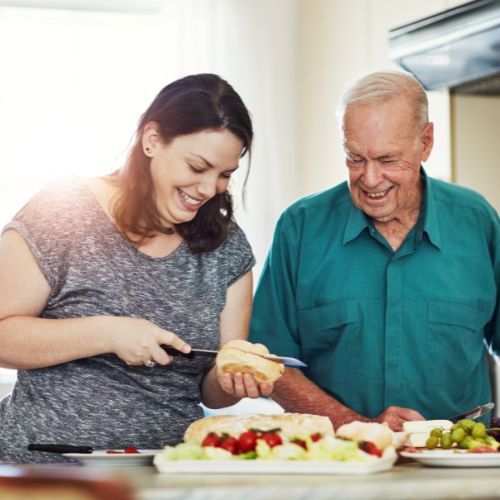Caring for elderly parents at home can be a fulfilling and rewarding experience when done with compassion and planning.
As families look for ways to improve the quality of life for their loved ones, care for the aging often becomes a central concern.
This article will explore some of the best strategies for supporting elderly parents at home, ensuring their safety, comfort, and well-being while maintaining a healthy family dynamic.

1. Create a Safe Living Environment
A safe home environment is essential to care for the aging effectively.
Start by evaluating your parents’ living space for hazards that could cause falls or injuries.
Remove loose rugs, secure electrical cords, and ensure all walkways are clear and accessible.
Install grab bars in the bathroom, particularly near the toilet and shower, to provide extra support.
Consider adding non-slip mats in areas prone to wet surfaces.
For better mobility, ensure furniture is arranged to allow easy movement with walkers or wheelchairs if necessary.
Adequate lighting is also key; use brighter bulbs and night lights to prevent accidents.
2. Establish a Daily Routine
A structured routine can bring comfort and stability to elderly parents, especially for those who struggle with memory loss or cognitive decline.
Plan daily activities like meals, personal care, and medication schedules at consistent times.
Include time for rest and relaxation, as energy levels often decrease with age.
When caring for aging parents, balance their independence with necessary assistance.
Encourage them to participate in tasks they can still manage, like simple chores, dressing, or light exercises.
A well-planned routine helps reduce anxiety while improving overall health and happiness.
3. Focus on Nutrition and Meal Planning
Proper nutrition plays a significant role in supporting the health of elderly parents.
Many aging individuals face challenges such as reduced appetite, difficulty chewing, or specific dietary restrictions.
To ensure their needs are met, prepare nutrient-rich meals that are easy to eat and digest.
Include a variety of fruits, vegetables, lean proteins, and whole grains to maintain their energy and strength.
For parents with limited mobility, set up a comfortable eating area and assist as needed.
Stay hydrated by encouraging frequent water consumption, as dehydration is common in older adults.
Meal prep and planning make it easier to deliver healthy, regular meals without added stress.
4. Manage Medications and Health Appointments
Medication management is critical when providing care for the aging at home.
Many elderly parents take multiple prescriptions, which can become overwhelming without proper organization.
Use pill organizers to sort medications by day and time to avoid missed or double doses.
Set reminders through alarms or smartphone apps to ensure timely medication intake.
Regular doctor visits are equally important to monitor their health and address any concerns.
Accompanying parents to appointments can help you stay informed about their condition and treatment plans.
Keep a record of medications, dosages, and medical history for easy reference in emergencies.
5. Encourage Physical Activity
Staying physically active is essential for the physical and mental health of elderly parents.
Low-impact exercises like walking, stretching, and chair yoga can improve balance, mobility, and strength.
Physical activity also reduces the risk of conditions such as heart disease, osteoporosis, and arthritis.
Tailor exercise routines to their ability level and consult a doctor before starting any new physical activities.
Simple activities like gardening, light housework, or short strolls in the neighborhood can help keep them moving and engaged.
Consistency is key when helping aging parents maintain an active lifestyle.
6. Support Their Emotional and Mental Well-Being
Caring for elderly parents goes beyond physical health; their emotional and mental well-being is equally important.
Loneliness and isolation can significantly impact aging individuals, leading to depression and anxiety.
Schedule regular opportunities for social interaction, such as family visits, calls, or video chats.
Encourage hobbies and activities they enjoy, like reading, painting, or puzzles.
If your parents are open to it, explore local senior programs or community groups where they can connect with peers.
Maintaining strong emotional bonds can provide comfort and joy to parents as they age.
7. Seek Professional Support When Needed
Providing care for the aging at home may eventually require outside assistance.
Caregiving can be physically and emotionally demanding, and it’s important to recognize when help is needed.
Consider hiring professional caregivers to provide part-time or full-time support for tasks like bathing, dressing, and meal preparation.
Home health aides or nurses can also assist with medical needs such as wound care or administering injections.
Respite care is another option that allows family caregivers to take breaks while ensuring their loved ones are still cared for.
Professional support can lighten your load and ensure your parents receive the best care possible.
8. Plan for Future Needs
While providing care at home, it’s essential to anticipate and plan for your parents’ evolving needs.
As they age, their level of care may increase due to declining health or mobility.
Have open and honest conversations about their wishes regarding future living arrangements, medical decisions, and finances.
Document important legal matters, such as power of attorney, wills, and advance directives.
Being proactive helps you make informed decisions while respecting your parents’ preferences.
Planning ahead can also reduce stress and ensure smoother transitions during times of change.
9. Take Care of Yourself as a Caregiver
Caring for elderly parents is a demanding responsibility that requires time, patience, and energy.
To provide the best support for your loved ones, you must prioritize your own physical and emotional well-being.
Schedule regular breaks, engage in self-care activities, and lean on friends or family for help when needed.
Joining caregiver support groups can provide a sense of community and valuable tips from others in similar situations.
Remember, taking care of yourself allows you to be more present and effective in caring for your parents.
Final Thoughts
Providing care for elderly parents at home is a meaningful way to ensure they enjoy comfort, dignity, and love in their golden years.
By creating a safe environment, focusing on their physical and emotional needs, and seeking professional support when necessary, you can offer exceptional care for the aging.
With careful planning and a compassionate approach, families can navigate the challenges of caregiving while building stronger connections with their loved ones.

